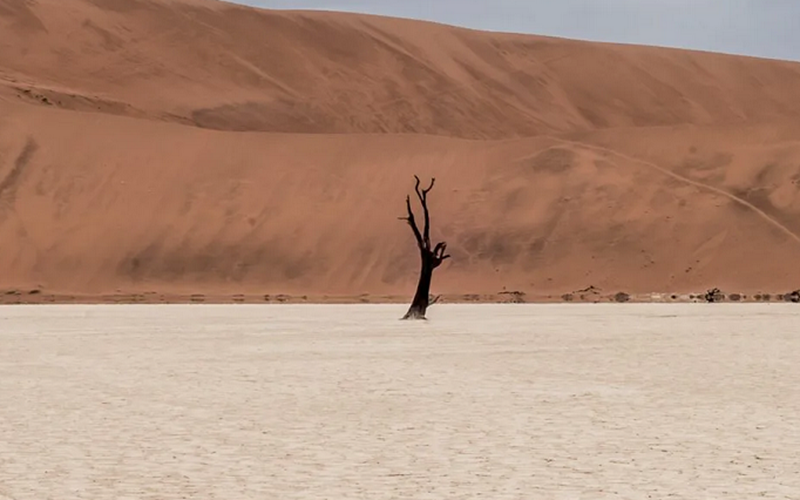

(Editor's Note: This blog was posted first on Dr. Ayar's blog site HERE)
(This is an excerpt from an upcoming book to be published by Seedbed.
We began our journey with Moses and the burning bush. In that story, God commanded Moses to take off his sandals because he was standing on holy ground. The ground was holy because God’s personal, holy Presence was in the bush. This whole encounter happened in the desert at the foot of Mount Sinai.
Interestingly, this story takes place in the desert. In the Bible, the desert is an unholy place. It’s lifeless and harsh. It’s where demons dwell. Satan tempted Jesus in the desert because the desert is the seat of government for the powers of darkness. The desert is the place of the curse. It is the place of death. The absence of life in the desert results from the absence of God, the Giver of Life. Once again, the desert is, above all other places, unholy.
Victor Hamilton points out that “God has a way of showing up at unexpected places such as bushes.”[1] He says,
It was at a bush that he appeared to Hagar […], and it was at a bush that he first appeared to Moses. And speaking of God showing up at unexpected places, perhaps one might see a parallel between the angel of the Lord appearing in the middle of nowhere to a shepherding Moses to make an important announcement and the angels showing up to a group of shepherds in the middle of nowhere to make an important announcement (Luke 2:8–20).[2]
Another one of those unexpected places that God shows up in fiery fashion is at Pentecost when the Holy Spirit descended on a group of fishermen and tax collectors. Soon after that, he even descended on gentiles (Acts 10). In the broader context of the biblical story, fishermen, tax collectors, and gentiles were “unholy ground.” Of all the holy people and holy places in the world, these were the least of them. These were the outsiders, not the temple priests and scribes. These were the equivalent of unholy desert ground.
It must have been a shock to Moses to hear God say that this desert ground surrounding this bush was holy. In Moses’s mind, that’s impossible. Places like Egypt and Canaan were holy places, not the desert. The gods dwell in lush gardens with perfect climates and plenty of food and drink, not in places like this, not in the place of curse and outcast. In this moment of coming to grips with the notion that God’s presence can make this cursed ground holy, perhaps Moses wondered, “If God can make this ground holy, can he make me holy?”
The desert is a lot like the human heart. It is the place of the curse, profane and utterly unholy. It is home to the powers of evil. It is absent of God’s blessing and life-giving presence. In the story of the burning bush, God’s holy Presence fills the heart of the bush yet doesn’t consume it. His Presence is so pure, so incorruptibly good, and so powerfully life-giving that it entirely sanctifies the place of its dwelling. This is the story of the divine Presence via the Holy Spirit coming home to the human heart. Because of Jesus, the Holy Spirit can rush into our hearts yet not destroy us. He can reverse the curse. He can make the place of the curse a holy habitation that is blessed with life and the fruit of life.
My point has two prongs. First, Jesus came for the sick, not for the healthy. Mark 2:15–17 says,
And as he reclined at table in his house, many tax collectors and sinners were reclining with Jesus and his disciples, for there were many who followed him. And the scribes of the Pharisees, when they saw that he was eating with sinners and tax collectors, said to his disciples, “Why does he eat with tax collectors and sinners?” And when Jesus heard it, he said to them, “Those who are well have no need of a physician, but those who are sick. I came not to call the righteous, but sinners.”
In other words, the proclamation of the gospel—the message of freedom from the guilt, power, and being of sin—is for those who know they need it (Matt. 5:3). It is for hearts the Holy Spirit has softened.
Second—and directly related to the first—no ground that is too unholy for God’s Presence to take up residence. His Presence breaks into the darkest places of our lives and turns deserts to gardens.
Graveyards to Gardens
In the story of the resurrection, Jesus turned a graveyard into a garden. Graveyards, like deserts, are unholy places. They are the place of death. In the Gospels, we find the demoniac in the graveyard (Mk. 5:1–20). Cemeteries are home to the powers of darkness because they reign over the kingdom of death. When Jesus goes into a graveyard—and a grave in the case of the resurrection—exciting things happen. After three days in the tomb, Jesus came back to life.
The first detail of the story that we encounter in the resurrection story according to John is, “Now on the first day of the week [new creation language] Mary Magdalene came to the tomb early, while it was still dark, and saw that the stone had been taken away from the tomb” (Jn. 20:1). Then, with tears in her eyes and the dawn breaking into the darkness of night, Mary sees the resurrected Lord and mistakes him for the gardener. This is one of my favorite moments in Scripture. I love this moment because the gardener is exactly who Jesus is. Jesus is the true gardener. Jesus is the Adam as he was always meant to be. Jesus, now with a resurrected body, is ready to launch the new age of the Spirit into the new creation. In this moment, Jesus makes the unholy ground of a graveyard into the Garden of the new creation.
What’s the significance of this? No ground that is too unholy for Jesus to redeem. He turns desert ground into holy ground, and he turns graveyards into the launchpad for the new creation. Every human heart is totally depraved. Every one of us has a diabolical, self-consuming inward bent. Even though we have set our faces against God, Jesus’s perfect sacrifice worked. The full obedience and righteousness of Christ was enough to remove every barrier between God and us. The blood of Jesus is powerful enough to purify every millimeter of the human heart. This means that the Holy Spirit, based on the work of Christ, can fill us in every part. God likes showing up in unexpected places, even those places of our hearts that we may think unredeemable.
The holy life is available to all. Because of the redeeming work of the eternal, all-powerful, transcendent Holy Trinity, we can be free from the guilt of sin, the power of sin, and even the being of sin. The work of Christ at Calvary for us is sufficient to make perfect peace between God and us. The work of the Holy Spirit is enough to bring the perfect, holy love of God rushing into our hearts, and his ability to heal our diseased nature makes us useful instruments in his hands to participate in his mission to redeem the world.
[1] Victor P. Hamilton, Handbook on the Pentateuch, 2nd ed. (Grand Rapids, MI: Baker Academic, 2005), 141.
[2] Ibid., 141.

